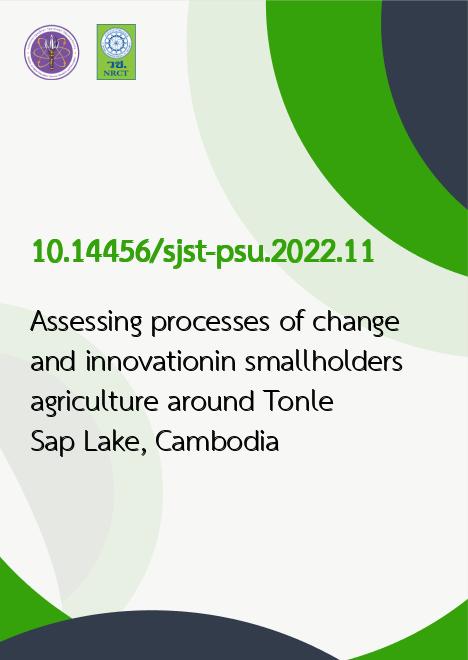
|
Assessing processes of change and innovationin smallholders agriculture around Tonle Sap Lake, Cambodia |
|---|---|
| รหัสดีโอไอ | |
| Creator | 1. Donira Khan 2. Didier Pillot 3. Prapinwadee Sirisupluxana |
| Title | Assessing processes of change and innovationin smallholders agriculture around Tonle Sap Lake, Cambodia |
| Publisher | Research and Development Office, Prince of Songkla University |
| Publication Year | 2565 |
| Journal Title | Songklanakarin Journal of Science an Technology (SJST) |
| Journal Vol. | 44 |
| Journal No. | 1 |
| Page no. | 66-71 |
| Keyword | sustainability of agricultural systems, innovation in agriculture, farming systems, Cambodia |
| URL Website | https://rdo.psu.ac.th/sjst/index.php |
| ISSN | 0125-3395 |
| Abstract | Sustainability of agricultural systems is often presented in the literature as the capacity of these systems to bemaintained over time, even though the circumstances in their environment may be changing when resources available get rare orwhen markets and value chains can be transformed. Such a vision tends to limit sustainability as a static concept. This paperchallenges such a static conceptual framework to propose an opposed one, where sustainability is ensured when the systems areable to change and innovate to adapt to their environment and achieve even better efficiency of the use of their resources(compared to before the modification in the environment). For illustrating this point of view, this paper assesses the dynamics offarming systems around Tonle Sap Lake, Cambodia. This rural province is facing a number of changes in its environment, whichmay be agroecological, as the regime of floods from the Tonle Sap every one year, or economical as the opportunity costs of thelabor that are pulled up by the rapid growth of the neighboring city of Siem Reap. It examines the interaction between resourceendowment and production strategies of the major stakeholders, capture the agricultural transformation in the study area. Thisstudy borrows agrarian system diagnosis framework, a multistage analysis, to identify the changes in the strategies of thestakeholders. In-depth interviews were first carried out to collect historical data and build pre-typology. The study then collectedquantitative data from 143 households to construct the main farm typology. The results reveal that five major distinctive farmtypes develop various innovative strategies in response to the modification of the environment to ensure their sustainability.However, there may also be some major innovations, like the extension of the broadcasting of the paddy extending in all systemsat the same time to replace the transplantation. The conditions for such a โbulk innovationโ, in response to sustainability needs,are discussed. The conclusion of this research confirms that sustainability should be held as a dynamic concept, adapted tosocieties in movement, rather than a resistance concept, marked by the maintenance of previous systems in changingenvironment. |
